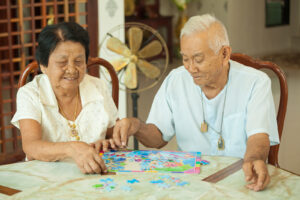How To Keep Your Senior Parent With Alzheimer’s Safe At Home

Alzheimer’s Care: Routines for Alzheimer’s in Chantilly, VA
If you have a senior parent that has Alzheimer’s keeping them safe is one of the highest priorities. As their Alzheimer’s progresses it can be more of a challenge to keep them safe, especially if they are living alone at home. But, your senior parent can stay in the home that is familiar to them and be safe too.
Alzheimer’s care, which is specialty care for seniors with Alzheimer’s, can help seniors stay safe at home. The care givers that provide Alzheimer’s care have specialized training in communication methods that can help them keep seniors with Alzheimer’s calm and focused.
They also are great at redirecting seniors with Alzheimer’s to keep them from wandering or doing dangerous things. In addition to getting Alzheimer’s care some things you can do to keep your senior parent with Alzheimer’s safe at home are:
Modify the Home Environment
Make modifications to the home environment to reduce hazards and enhance safety. Remove loose rugs or secure them with non-slip backing to prevent tripping. Install grab bars in the bathroom and near the bed to assist with mobility. Keep pathways clear of clutter to minimize the risk of falls. Paint the walls different colors so that seniors will be able to tell where one wall ends and the other begins. As their depth perception fades this can help prevent falls.
Secure Doors and Windows
People with Alzheimer’s may wander and become disoriented, putting them at risk of getting lost or injured. Install locks on doors and windows that are out of reach or use childproof locks to prevent your loved one from wandering outside unsupervised. Consider installing door alarms or motion sensors that alert you if they attempt to leave the house.
Provide Supervision
Supervision is essential for ensuring the safety of a senior parent with Alzheimer’s. If possible, arrange for someone to be present with them at all times, especially during periods of confusion or agitation. Family members, professional caregivers, or respite services can provide additional support and supervision when needed. Alzheimer’s care is available around the clock for seniors that need it.
Establish Routines
Establishing daily routines can help reduce anxiety and confusion for seniors with Alzheimer’s. Create a structured schedule for meals, medication, and activities, and try to stick to it as closely as possible. Consistency and predictability can provide a sense of security and stability for your loved one.
Use Assistive Devices
Staying organized and using assistive devices can help prevent accidents and keep your senior parent safe. Label drawers and cabinets with pictures or words to assist with memory and organization. Use pill organizers or automated medication dispensers to ensure medications are taken correctly and on time. Consider using GPS tracking devices or wearable technology to locate your loved one in case they wander away from home.
Upgrade The Lighting
Poor lighting can increase the risk of falls and accidents, especially for seniors with Alzheimer’s who may have impaired vision. Ensure that the home is well-lit, especially in hallways, staircases, and other high-traffic areas. Use nightlights or motion-activated lights to illuminate pathways during nighttime.
Improve Kitchen Safety
Cooking can be hazardous for individuals with Alzheimer’s due to forgetfulness or confusion. Take precautions in the kitchen by removing potentially dangerous items such as sharp knives or heavy pots. Consider installing stove guards or automatic stove shut-off devices to prevent accidental fires or burns.
Remember that safety will be an ongoing challenge. As your senior parent’s illness progresses you may need to change or adapt the safety measures you have in place to meet their new level of impairment.
